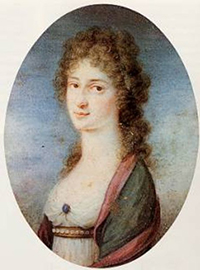
Antonie Brentano
Much has been written about the women in Beethoven’s life, and undoubtedly you have either read or seen one or the other fictional take on the matter. It all seems a bit muddled and mysterious, so let’s try to unravel a couple of romantic strands. Much of what we actually know comes from an unsent impassioned letter to a woman, which was found in Beethoven’s estate after his death. Apparently writing in the summer of 1812, the letter was simply addressed to the “Immortal Beloved.”
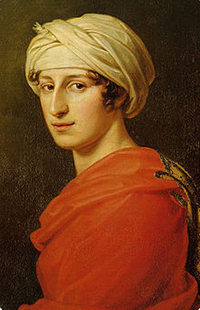
Portrait of Antonie Brentano by
Joseph Karl Stieler, 1808
“My angel, my very self,” he writes. “Only a few words today and at that with pencil. Not till tomorrow will my lodgings be definitely determined upon—what a useless waste of time. Why this deep sorrow when necessity speaks? Can our love endure except through sacrifices, through not demanding everything from one another; can you change the fact that your are not wholly mine, I not wholly thine?… I can only live wholly with you or not at all. I have resolved to wander about in the distance, until I can fly into your arms, and can call myself entirely at home with you, can send my soul embraced by you into the realm of spirits.”
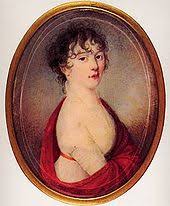
Giulietta Guicciardi
Today we know this woman to be Antonie Brentano, a married woman with four children. Antonie, with her husband away and dealing with financial matters in Frankfurt, suffered from long periods of depression, and Beethoven consoled her with his piano improvisations. Their attachment transformed itself into love, and she was the only woman so far as we know to ever return Beethoven’s love. Yet, Antonie was fated to depart Vienna for Frankfurt to be with her husband, and the letter raising the issue of living together was written shortly after the final auction of her father’s possessions. But even if Antonie was willing to leave her husband, Beethoven was unprepared for such a commitment. Eventually he renounced the possibility of a union, and they separated for good. Although they did keep in touch, they never saw each other again.
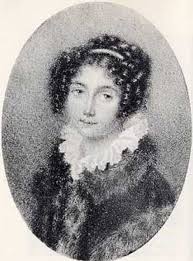
Josephine Brunsvik
From Johanna von Honrath, a girl he adored in his youth, to Countess Marie von Erdödy and the iconic Antonie Brentano, a pattern emerges among the women in Beethoven’s life: affection, friendship, respect, passion—though probably mostly platonic—and eventually dejection. Beethoven was certainly highly susceptible to feminine beauty and charm, and an early biographer and friend reported “he was never without love, and most of them were from the upper ranks.” As Beethoven writes to a friend, “You can scarcely believe what an empty, sad life I have had for the last two years. My poor hearing haunted me everywhere like a ghost; and I avoided all human society. I was forced to seem a misanthrope, and yet I am far from being one. This change has been brought about by a dear charming girl who loves me and whom I love … and for the first time I feel that marriage might bring me happiness. Unfortunately she is not of my class.” The charming girl was no doubt his piano student Countess Giulietta Guicciardi. She was not quite 17, and too young, and perhaps too spoilt, to take Beethoven’s devotion very seriously, though no doubt she was flattered for a time by the attentions of a famous composer. Much has been made of the fact that it was to her that he dedicated the ‘Moonlight’ Sonata written in 1801.
Ludwig van Beethoven: Piano Sonata No. 14, Op. 27, No. 2 “Moonlight” (Emil Gilels, piano)

A plaque affixed to the wall of a house in Jedlesee, Vienna, commemorating the residence there of Anna Maria Erdödy, Beethoven’s patroness and friend
Beethoven spent much time in a showy pursuit of women who “could not, or would not, return his affection, and the very fact that most of them were from the upper classes meant that there was usually an insuperable barrier of social class to prevent the relationship from going too far.” Beethoven was generally not intimidated by people of higher social standing, as he felt in possession of an inner nobility that was equal to any title. He freely moved in aristocratic circles, attended their evening soirees, and taught piano lessons to their daughters. Yet, class differences always stood in the way of any official recognition of his love affairs or even marriage.
The composer’s actual appearance was probably quite different from the idealized image with which most people are familiar. He was according to contemporaries “only about 1.6 meters (5 feet, 2 inches) tall, an ugly man, often unkempt, with a pockmarked face.” But he had a lot of charisma, and women found him highly attractive. Countess Giulietta Guicciardi once described him as, “very ugly, but noble, refined in feeling and cultured.” As a teacher, Beethoven spend long hours in the company of aristocratic and beautiful young women who were greatly attracted by his passion and mystery, but ultimately had no choice but to back away.
Beethoven always professed his desire for a true union of hearts, but a stable relationship, as we would call it today remained out of reach. His withdrawal from women, already hinted at in his letter to the “Immortal Beloved” is modeled on an exalted, mystical state of self-denial. And in a much-quoted passage Beethoven perceives a moral gulf between love and the mere release of sexual tension. “Sensual gratifications without a spiritual union,” he writes, “is and remains bestial, afterwards one has no trace of noble feeling but rather remorse.” Maynard Solomon writes, for Beethoven “this unresolved conflict over the feminine in which desire and renunciation remains in perpetual contention.”
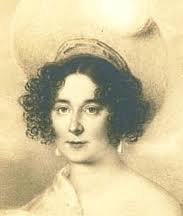
Therese Malfatti
Emotional crisis and artistic creativity do sometimes coincide, but it would certainly be too simplistic to say that Beethoven’s doomed relationships—as perhaps he unconsciously intended—form the basis of his immense body of work. Nevertheless, he was capable of revealing unbelievably beautiful sonic representations of what it is like to love or to be in love. And these moments of highly personal intimacy are not limited to romantic love, but address all forms of love, be it family, friends, life or idealized. And they can be found in just about everything he composed.
Ludwig van Beethoven: An die ferne Geliebte (To the distant Beloved), Op. 98 (Christian Gerhaher, baritone; Gerold Huber, piano)


Great read and glad to see Beethoven’s nobility extended to his deepest personal feelings toward women meant having a spiritual connection as well
Timb Hello
Yes very well said
Yes the big hearted always of noble of intentions Beethoven
His transcendental music such a divine heritage for us all to explore
Thank you Beethoven for your dedication and
commitment even in the face of your own personal adversity